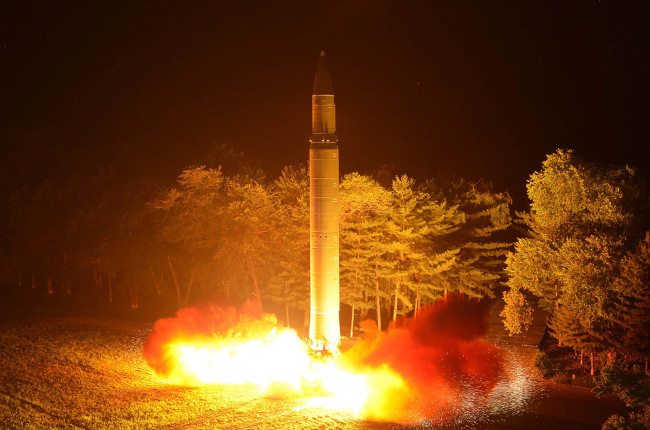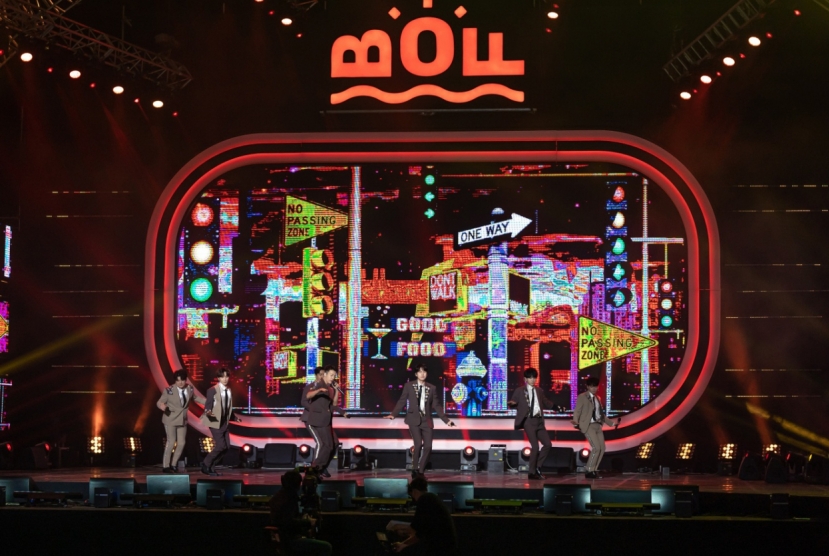An airplane crew flying over Japan saw North Korea's missile as it plunged back through the atmosphere last week, their airline said Monday, as South Korea and the US kicked off their largest ever joint air exercise.
Hong Kong carrier Cathay Pacific released a statement saying the crew of flight CX893 spotted "what is suspected to be the re-entry" of the missile as they flew from San Francisco to the southern Chinese city.
In a separate message to staff, Cathay general manager Mark Hoey said the crew described seeing the missile "blow up and fall apart", the South China Morning Post reported.
Pyongyang sent tensions soaring on the Korean Peninsula five days ago when it announced it had successfully test fired a new ICBM, which it says brings the whole of the continental United States within range.

Analysts say it is unclear whether the missile survived re-entry into the earth's atmosphere or could successfully deliver a warhead to its target -- key technological hurdles for Pyongyang.
The isolated and impoverished North has staged six increasingly powerful atomic tests since 2006 -- most recently in September -- which have rattled Washington and its key regional allies South Korea and Japan.
On Monday the US and South Korea started their largest ever joint air exercise, an operation Pyongyang has labelled an "all-out provocation".
The five-day Vigilant Ace drill involves 230 aircraft, including F-22 Raptor stealth jet fighters, and tens of thousands of troops, Seoul's air force said.
Pyongyang over the weekend blasted the drill, accusing US President Donald Trump's administration of "begging for nuclear war".
As tensions surged, US Senator Lindsey Graham, an influential Republican and foreign policy hawk, warned that the US was moving closer to "preemptive war" with the North.
"If there's an underground nuclear test (by the North), then you need to get ready for a very serious response by the United States," Graham told the CBS show "Face the Nation".
In recent years Pyongyang has accelerated its drive to develop nuclear and missile technology capable of threatening the US, which it accuses of hostility.
"The preemption is becoming more likely as their technology matures,"
Graham said.
His remarks echoed those of Trump's National Security Adviser HR McMaster, who told a security forum on Saturday that the potential for war with the North "is increasing every day".
As well as featuring the latest generation of stealth fighters, this year's wargames involve simulated precision attacks on the North's military installations, including its missile launch sites and artillery units, Yonhap news agency said, citing unnamed Seoul sources.
Risks of war
The North has boasted that the Hwasong 15 ICBM tested on Wednesday is capable of delivering a "super-large" nuclear warhead anywhere in the US mainland.
Analysts agree the latest test showed a big improvement in potential range, but say it was likely achieved using a dummy warhead that would have been quite light.
They say a missile carrying a much heavier nuclear warhead would struggle to travel as far.
They are also sceptical that Pyongyang has mastered the sophisticated technology required to protect such a warhead from the extreme temperatures and stresses encountered as the missile hurtles back to Earth.
The latest launch, which saw the missile drop into Japan's economic waters, was condemned by Tokyo's parliament Monday, which slammed the North's rogue weapons programme as an "imminent threat".
Washington has called on China, the North's major ally, to do more to rein in Pyongyang's nuclear ambitions.
On Monday China's foreign ministry on Monday warned that the Korean peninsula remained "highly sensitive" and called on all sides to "do more things to ease the tension and avoid provoking each other".
The North's leader Kim Jong-Un has presided over significant progress in the country's widely-condemned nuclear and missile programmes since taking power in 2011.
A nuclear standoff between Kim and Trump in recent months has seen the pair trade personal insults.
The tensions have fuelled concerns of another conflict, more than six decades after the 1950-53 Korean War that left much of the peninsula in ruins.
But even some Trump advisers say US military options are limited when Pyongyang could launch an artillery barrage on the South Korean capital Seoul -- only around 50 kilometres (30 miles) from the heavily-fortified border and home to 10 million people.
Estimates on the potential casualties from another war vary widely.
The North has thousands of conventional artillery units along the border with the South that analysts say could kill tens of thousands.
In one of the latest estimates, Scott Sagan, senior fellow at the Centre for International Security and Cooperation at Stanford University, said the toll could be as high as one million people from just the first day of a conflict.
-
Articles by AFP








![[KH Explains] How should Korea adjust its trade defenses against Chinese EVs?](http://res.heraldm.com/phpwas/restmb_idxmake.php?idx=644&simg=/content/image/2024/04/15/20240415050562_0.jpg&u=20240415144419)











